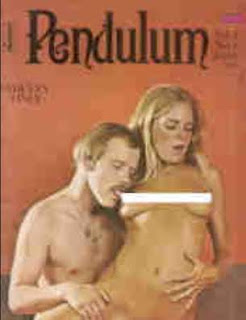 |
| Two ladies get up close and personal. |
NOTE: This article continues my coverage of Angora Fever: The Collected Short Stories of Edward D. Wood, Jr. (BearManor Bare, 2019).
 |
| Fog in Orgy of the Dead. |
The story: "Out of the Fog," originally published in Two Plus Two, vol. 3, no. 2, May/June 1971. Credited to "Joe Baga."
Synopsis: Margie, 32, is the successful and attractive personnel manager for a large department store. She spends her weekends drinking heavily and having sex with lots of different women, though she's getting tired of inexperienced or selfish young partners. One foggy February night, she pulls into a cocktail lounge she has never visited before. There, she spots a young lady she assumes is a streetwalker and buys her some drinks. After a somewhat contentious introduction, the two women strike up a conversation. It turns out the stranger is named Toni, and although she is also a lesbian, she services male clients. She's in a bad mood because her customer stood her up. Margie invites Toni back to her place, and the younger woman accepts the invitation.
Wood trademarks: Fog (cf. "The Night the Banshee Cried"); fur (artificial in this case, cf. "The Hazards of the Game," "So Soon to Be an Angel"); "boobies" (cf. "Bums Rush Terror" "The Hooker"); heavy drinking on the weekends (cf. "To Kill a Saturday Night"); fluff (cf. "The Last Void," "The Fright Wigs"); cocktail lounges (cf. The Cocktail Hostesses); Scotch (cf. "A Taste for Blood," "So Soon to Be an Angel"); prostitution (cf. "The Hooker," Orgy of the Dead); anti-men rant (cf. Drop Out Wife).
Excerpt: "As she pulled the bottom of her fake fur coat down through the belt, giving the coat an even more full-skirted appearance, she made up her mind that any fluff she’d bring home that night wasn’t going to be some spring chicken fresh from high school. She wasn't in the mood to be a teacher that weekend. Just for once she wanted to lay back and enjoy herself with somebody who had like talents."
Reflections: This is the first of two back-to-back "fog" stories in Angora Fever, which got me to thinking about fog as a motif in Ed Wood's career. Plan 9 from Outer Space (1959) and Orgy of the Dead (1965) both lean pretty heavily on the fog machine -- it's an easy way of creating atmosphere while covering up a sparse set -- and there's that famous quote from Glen or Glenda (1953) about Glen's mind being "in a muddle, like in a thick fog." But, apart from "The Night the Banshee Cried," fog wasn't a major motif in Blood Splatters Quickly, and until this story, it hadn't crept into Angora Fever yet either.
Funnily enough, even though the graveyard in Orgy of the Dead is perpetually shrouded in fog, Ed's script indicates that the mist and haze are out of place in this story. As Criswell intones, "It is said on clear nights, beneath the cold light of the moon, howl the dog and the wolf, and creeping things crawl out of the slime. It is then the ghouls feast in all their radiance." So Eddie apparently imagined this story taking place on a fog-free evening.
As for "Out of the Fog" itself, this was another story that defied my expectations. Given that Margie had never visited this cocktail lounge before, and that it had emerged mysteriously from the fog (a la Brigadoon), I thought sure there was going to be some supernatural element to the story. Perhaps Margie had crossed over into The Twilight Zone, and we'd ultimately learn that none of this -- the lounge, the girl, etc. -- is real. Since Margie has no qualms about combining drinking and driving ("She didn’t want to pull off a drunk driving charge, but she knew she could handle three scotches without any trouble."), I thought there might be a twist ending wherein Margie's body is pulled from her vehicle, since she'd crashed her car into a tree in the fog. And this story would be revealed as her last fantasy as she slipped into unconsciousness.
But, no, nothing of the sort happens. This is one of the quieter, more character-driven stories in Angora Fever. It's simply about two characters coming together and talking. The fog is merely a background element, not a major plot device. So Eddie can go subtle.
Next: "That Damned Faceless Fog" (1971)















